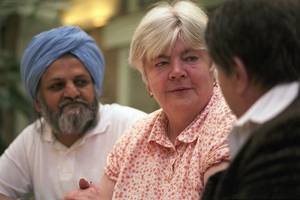New study launched to assess levels of antimicrobial resistance in healthy people
The study aims to learn about antimicrobial resistance in healthy people to inform better ways of tackling antimicrobial resistant infections in different populations.

Three adults in conversation
The UK Health Security Agency (UKHSA) has launched surveillance to assess the extent of antimicrobial resistance (AMR) in healthy people across the country.
Up to 2,000 people will be invited to submit stool samples and nose and throat swabs for the study, which will help scientists understand more about the factors influencing bacteria in our body. By understanding more about the drivers of AMR in the community, we will better be able to design ways to reduce antimicrobial resistant infections.
A large part of AMR understanding is based on bloodstream infections in hospitalised patients – infections at the most severe end of the spectrum. However, everyone has bacteria in their bodies and some of these bacteria may be antibiotic resistant. Often these bacteria won’t cause any harm, unless they get into a part of the body they shouldn’t be – like the urinary tract or lungs, or if they spread to other people.
Through the surveillance study, UKHSA scientists seek to understand more about the levels of antibiotic resistant bacteria found in the general population, including carbapenem-producing Enterobacteriaceae (CPE), extended-spectrum beta-lactamase (ESBLs), and methicillin-resistant Staphylococcus aureus (MRSA) amongst others, in humans across England.
The study will also explore the prevalence of the fungus Candida auris in the community. The surveillance will also enable UKHSA to compare the change in prevalence of AMR in the population compared to a previous study in 2014 focused on ESBLs.
The work builds on UKHSA’s extensive AMR surveillance programme and aims to further the understanding of how AMR impacts different segments of society, to enable the design of better ways to tackle AMR, tailored to different populations if needed.
The study will look at age, sex, ethnicity, and geographical location to understand if there are any key differences between different demographics. It will also consider different risk factors for AMR, including:
- travel
- diet
- healthcare contact
- household transmission
Dr Russell Hope, Deputy Director, AMR Division at UKHSA, said:
Antibiotic resistant bacteria can cause very severe and difficult to treat infections – killing thousands of people every year in this country and globally, as well as having a huge economic impact. However, very little is known about how commonly antibiotic resistant bacteria are found in the general ‘healthy’ population – mixed in with the ‘good’ and ‘bad’ bacteria that live in our guts.
By understanding more about the burden of AMR in healthy people in the general population and the factors that mean someone is more likely to be carrying a resistant organism, we will be able to design better ways to tackle AMR in different populations.
We can all take action to reduce antibiotic resistance. Please trust your healthcare professional and take antibiotics only as prescribed, never share with others and don’t save for later. Taking antibiotics when you don’t need them puts you and your loved ones at risk of having an untreatable infection in future.
Antibiotic resistance occurs naturally, but inappropriate usage and overuse of antibiotics can accelerate this process. Antibiotic resistant bacteria are less likely to respond to treatment, causing serious complications, including bloodstream infections, sepsis and hospitalisation, so it is important to take antibiotics only when they are prescribed and necessary for the condition.
Health Minister Maria Caulfield said:
AMR is a silent killer that costs over a million lives across the world per year.
The UK is a global leader in tackling this threat and we launched a vital Call for Evidence last year to help us shape our next 5-year National Action Plan on AMR.
This new study will build the evidence base so we can better understand what causes AMR to help us ramp up our efforts to tackle this deadly issue.
UK Health Security Agency press office
10 South Colonnade
London
E14 4PU